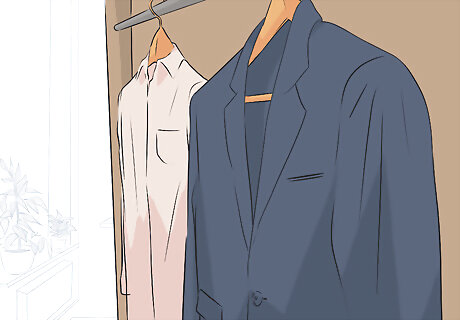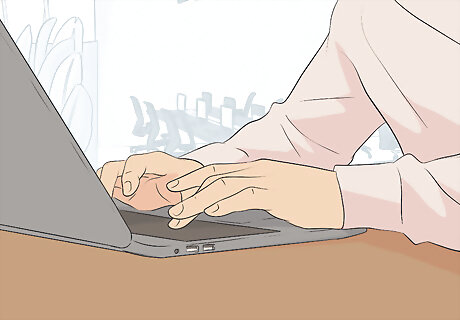
views
- Research the company you're applying for and reread the job description to see which skills and experiences to emphasize during the interview.
- Prepare a list of small-talk topics and questions about the position to show you’ve done your research and you’re interested in the job.
- Be polite, listen attentively, and be honest when talking about your interests, values, and experiences.
Brush up on the company.

Research their mission statement, values, awards, and clients. Pay special attention to any recent news or developments, especially anything that might impact your potential position with the company. Look at the company’s social media to get a sense of the company’s culture. Use this knowledge to tailor your responses so that you can show interviewers that you have a genuine interest in the company. Use information about the company to ask questions that will generate a conversation with your interviewer. For example, you could ask, “I saw on Twitter that you recently held a company-wide charity event. Can you tell me how else the company facilitates charitable giving in the community?” Read company reviews on a site such as Glass Door to read reviews from current and past employees. Not only will this help you know what to and not to do during the interview process, but it can help you decide whether or not you’d really like to work for the company.
Review the job description.

Discuss how you demonstrate the skills listed in the description. Jot down a few specific skills and experiences the company is looking for in a candidate. Then, find ways to tie these into their own skills and experiences. For example, if the job description says that the company is looking for a candidate with “strong leadership experience,” think of a few examples of times when you displayed leadership skills. In your interview, find a natural way to integrate this information into the conversation. For example, if the interviewer asks, “What professional achievement are you most proud of?” demonstrate your leadership skills by saying something like “In my previous position, I led a team of five developers to design a new software for our client, which was a huge success.”
Study your resume.

Be prepared to talk about your skills and experience. Before the interview, take some time to study your previous positions and practice talking about them while keeping the company and the job position you’re applying for in mind. To make your explanations sound more natural, practice talking about your previous job and internship experiences and your achievements with a friend or close family member. “As an intern for Mountain Designs, I managed their social media and created graphics using Adobe InDesign and Photoshop to market the company’s events and services.” While talking about your skills and what makes you a good candidate, make sure to bring up your “soft” skills as well as your “hard” skills. Your “soft” skills include personality traits and other skills that can’t easily be quantified such as “empathy,” “adaptability,” and “critical thinking.” Your “hard” skills include technical knowledge or training that you’ve gained throughout your career, such as “mobile development” or “statistical analysis.”
Prepare stories that demonstrate your skills and experiences.

Talk about how you conquered a challenge or learned from failure. Many interviewers will provide prompts to give you the opportunity to show off your abilities and accomplishments, such as “Tell me about a challenge you faced at work and how you overcame it” or “Tell me about a failure you experienced and how you handled it.” When preparing answers to these questions, try using the STAR method: describe the (S) situation you dealt with, the (T) task you were given to deal with the situation, the (A) action you took, and the (R) result of your action and what you learned overall. “In my previous job as a manager for Greenfelder, I led and worked with a large team on a project for a major client (S). One of my teammates quit during the project, and I was chosen by my supervisor to take over their responsibilities (T). I prioritized what needed to be done and delegated some of the tasks I couldn’t handle to my other teammates (A). As a result, we created the best product possible under the circumstances, and our timeliness satisfied our client and impressed my boss (R).” “When I was working for Boehm, I worked with a team to complete a complex project with a tight deadline. As the deadline approached, I realized that I had underestimated the amount of work required, and our team was falling behind schedule (S). As the team leader, I had to assess the situation, address the issue, and find a solution to get the project back on track (T). I called a meeting to discuss the situation and identify what was causing delays. To improve efficiency, I implemented daily check-ins and facilitated better communication among team members (A). Although my error initially caused setbacks and challenges, the adjustments we made allowed us to regain momentum, and in the end, the client was pleased with the results (R).”
Prepare a list of questions to ask the interviewer.

Inquire about the position or the work environment. This can show your interest in the job and give you more insight into the position and the company’s culture. Unless your employer brings it up, avoid asking questions about your salary, benefits, and opportunities for career advancement. Make sure that you prepare questions that center around specifics about the job, the company’s culture, or how your skills fit into the company’s goals.Here are some questions you could ask: Has the company faced any major challenges recently and how did the team overcome them? What do you like most about working here? What are the biggest challenges the person working in this position will face? What is a typical day/week like in this position? What skills are the most important to succeed in this company/position?
Come up with a couple of relatable small talk topics.

Engage in small talk to create a positive, memorable interview. Before entering the interviewing space, think about some small-talk topics where you and the interviewer might have shared interest. For example, if you see a current event or news story that could be relevant to the company, ask about it! If you have children and see a family picture on the interviewer’s desk, ask how old their kids are and talk about your own. Using small talk to make a connection can make the interview run smoothly and make you look friendly and confident to the interviewer. Make sure not to bring up any personal problems, and don’t talk negatively about anyone you worked for in the past. Although it may be relevant to your conversation, negative talk can make the impression that you might be a difficult employee to work with.
Lay out your professional attire and materials ahead of time.

Dress appropriately to set the tone for the interview. Pick the perfect outfit and make sure it’s comfortable and fits well so you feel confident and undistracted during the interview process. Lay your clothes out the night before so you can check for any tears, stains, and missing buttons. You might wear a dark suit with a matching jacket and pants or a skirt, for example. Underneath, you could wear a nice dress shirt and dress shoes or black pumps. Or, wear a shirt or blouse with a pair of dress pants for a slightly more casual look. Make sure to iron your suit or shirt the night before. If you don’t have an iron, steam your clothes to remove wrinkles. In addition, carry a folder or a briefcase into the interview with copies of your resume, your cover letter, a list of questions you want to ask the interviewer, a notepad, and a pen. This can let your interviewer know that you are well-prepared and serious about the position.
Be kind and polite to everyone you meet during the interview.

Make a good first impression by showing respect. From the people walking into the building to the receptionist at the front desk, you never know whose input might impact the hiring decision or who might be your future managers, coworkers, or clients. Don’t forget to make eye contact and be fully engaged in all of your conversations. If your interview takes place over lunch or dinner, be polite and kind to the waitstaff. If possible, tip your servers and remember to thank your interviewer for the meal if they’re paying.
Act confident to make a great first impression.

Be positive and self-assured during the interview. Plan to arrive early and take the extra time to breathe and relax. When you meet the interviewer, shake their hand firmly yet warmly and convey confidence. Maintain eye contact and smile confidently throughout the interview, but make sure not to stare. Make sure to know your interviewer’s first and last name and its pronunciation. If you don’t know it before the interview, you can call ahead of time or ask the receptionist in person. Also, use their official title unless they tell you otherwise.
Project positive energy through your body language.

Stand or sit up straight, make eye contact, and avoid fidgeting.Take a few minutes before the interview to channel your inner happy place and enter with a positive and optimistic attitude. Engage fully and try not to let your thoughts wander to what you’re going to say next. To let your interviewer know you’re listening attentively, sit straight and lean slightly forward. Slouching, crossing your arms, avoiding eye contact, or leaning back can communicate that you’re underconfident or disinterested in the conversation. To appear confident and energetic, maintain eye contact and be mindful of your posture throughout the interview. Practice being interviewed with a friend to reduce any nervous energy. If your voice shakes or you find yourself fidgeting or shifting in your seat, gently check in with your body and take a couple of deep breaths. You’ve got this!
Be yourself.

Be honest and confident in who you are and what you bring to the table. Remember that this interview is not only an opportunity for the employer to evaluate you but also a chance for you to assess whether or not the job is right for you. Resist the temptation to mold yourself into who you think the interviewer wants. Focus on being sincere in your responses, and speak honestly about your experiences, interests, and values. If you feel like you’re underqualified for the position, avoid downplaying your skills! Instead, focus on what you bring to the table and express that you’re willing to learn more. Be honest with your interviewer about who you are. Whether you dress a certain way because of your religious or spiritual beliefs, dye your hair a certain color, or have tattoos or piercings, don’t hide your identity. If your potential employer doesn't appreciate who you are and what you bring to the table, that may be a sign that this job would not be a good fit for you.
Follow up with a thank-you note after the interview.

Write a message to make yourself stand out as a candidate. Immediately after the interview, in either a handwritten note or an email, thank the interviewer and include one or two of the things from the interview that makes you excited about the job. Briefly highlight your job qualifications. If your interviewer didn’t talk about it already, share your interest in hearing about the next step in the interview process. “Dear [Interviewer or Hiring Manager], Thank you for taking the time to meet with me earlier today. I enjoyed our conversation about the [job name] position and appreciated learning more about the company. It sounds like a rewarding role, and I’m especially excited about [one or two aspects of the job that excite you]. I think my experience as [previous job/internship information] would make me an excellent candidate for this position. I look forward to discussing the next steps for this position. Please don’t hesitate to reach out if you have questions. Thank you again for this opportunity, [name].



















Comments
0 comment